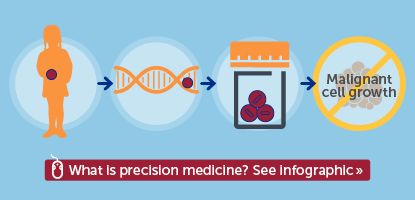Precision Cancer Medicine
Dana-Farber/Boston Children's is at the forefront of a new and expanding approach – called precision medicine or personalized medicine – to treating cancer and blood disorders in children and young adults.
What is precision cancer medicine?
Cancer develops when damage to cells' DNA causes them to grow and divide uncontrollably, eventually forming malignant tumors. Scientists have discovered that each patient’s cancer is driven by a unique combination of DNA changes, collectively termed its tumor “profile.”
The goal of precision cancer medicine is to individualize treatments by tailoring them to the genetic characteristics of each patient’s cancer – for example, selecting drugs matched to the tumor profile. In some cancer types, precision cancer medicine has decreased the side effects of treatment and/or increased the effectiveness of treatment.
Precision medicine at Dana-Farber/Boston Children's:
Researchers and clinicians at Dana-Farber/Boston Children’s are working together to bring the most advanced tumor profiling techniques to children with cancer. All patients at Dana-Farber/Boston Children’s with a possible malignancy have access to leading-edge precision medicine research, which provides the physician and patient access to valuable information about their unique tumor profile.
Trials conducted by Dana-Farber/Boston Children's researchers are making these advanced tumor profiling techniques available to some patients not receiving care at Dana-Farber/Boston Children's.
More information about participating in precision cancer medicine clinical trials:
Any child coming to Dana-Farber/Boston Children’s (or adults to Dana-Farber Brigham Cancer Center) for treatment, consultation, or a second opinion can join our Profile research study, one of the country’s most comprehensive precision cancer medicine initiatives. Patients simply provide consent for use of their tissue samples for research. No additional biopsies or blood draws are required beyond those already taken for diagnosis or treatment.
All types of hematological (blood) cancers, solid tumors, and brain tumors are studied in the Profile research study. Ultimately, this important research project will result in a database of genetic changes in all types of cancer. The findings of Profile research are advancing scientists’ understanding of the genetic causes of cancer and how knowing that information may ultimately lead to improved treatment.
Sequencing of the samples, which is done at the Center for Advanced Molecular Diagnostics at Brigham and Women’s Hospital, involves detailed analysis of over 400 genes in tumor cells that have been implicated in or suspected of causing cancer. This analysis can detect mutations – “typos” in the letters of the DNA code – as well as segments of genetic code that are missing or duplicated, and broken or reshuffled chromosomes.
This testing is being performed primarily to increase scientific knowledge. However, if an individual’s test reveals information that could be of clinical benefit, those results will be returned to his or her doctor as long as the patient and/or their family indicated an interest in the results when signing up for the study. Some genetic changes indicate that a certain drug will be particularly effective, while other DNA alterations might indicate that the tumor is resistant to specific treatments.
In certain cases, the culprit mutations in a patient’s tumor can serve as “targets” for new designer cancer drugs. Such targeted drugs – unlike conventional chemotherapy – attack specific molecules and processes in cancer cells to shut down their growth, while sparing normal cells and tissues that don’t have these targets.
The individualized cancer therapy 2 (iCat2) study is being conducted by the GAIN (Genomic Assessment Informs Novel therapy) consortium.
The iCat2/GAIN study is available at Dana-Farber/Boston Children’s and 10 other hospitals. In this study, researchers are investigating whether the latest approaches to tumor profiling will result in more precise diagnosis and more effective treatment for children, adolescents, and young adults with solid malignancies. Patients who are enrolled have their cancers sequenced — sometimes using several different sequencing tests. Many of the test results and expert interpretations are returned to the treating physician and ultimately to the patient.
Children and young adults can participate if they have either:
- A solid malignancy outside the brain with an unclear diagnosis after standard pathology review
- A solid malignancy outside the brain that is recurrent, refractory to treatment, or more difficult to cure with standard therapy approaches
If you meet the criteria above, further explanation about the iCat2/GAIN study and the requirements for participation are outlined for your physician here.
“My child is not a patient at Dana-Farber/Boston Children’s, how can he/she participate?”
Starting in September 2017, enrollment in the iCat2/GAIN protocol has expanded to include patients treated at hospitals other than the 11 hospitals originally conducting the study. This expanded study is especially seeking participation from patients with spindle cell malignancy or a sarcoma without a clear diagnosis after standard pathology review.
Patients, their parents, or their physicians who are interested in the iCat2/GAIN study should contact GAINConsortium@dfci.harvard.edu.
Children and young adults with high-risk leukemia may be eligible to participate in the Matched Targeted Therapy (MTT) for high-risk leukemias study, which is being conducted by the Pediatric Leukemia Precision-Based Therapy (LEAP) Consortium. It will investigate the range of mutations found in children with high-risk leukemia and describe the clinical outcomes of patients who receive a matched targeted therapy.
This precision medicine study will determine whether it is possible to use profiling results to determine a matched targeted therapy for children and young adults with high-risk leukemia (including relapsed acute lymphoblastic leukemia and acute myeloid leukemia). Once the profiling is performed, the results are evaluated by an expert panel of physicians, scientists, and pharmacists and communicated to the patient’s primary oncologist.
Dana-Farber/Boston Children’s offers a range of clinical trials based on gene variations. To learn more about the clinical trials described above, or to explore our additional clinical trials, you can search our clinical trials or email us at clinicaltrials@danafarberbostonchildrens.org.

 Translate
Translate 
